The main thing Frank has going for it is that Frank is a guy who wears a giant fake head and never takes it off. Which is good for quite a bit of entertainment before the movie falls apart. It’s not even revealing Frank’s real head that’s the problem. The movie goes off the rails well before that unfortunate decision plays out. Why does the fake head come off? So a lesson may be learned, and personal growth attained, heart-warming indie-movie style.
Frank, a new movie directed by Lenny Abrahamson (and yet to open widely; this report from the S.F. Int’l Film Festival), suffers from an interesting problem. It’s played as a heart-warming indie, where a schlub of a guy steps over the line into egotism, sees his mistake, and makes everything right. Only the actual fact of what we see on-screen is not that at all. We see a talentless schlub turn into a talentless, self-interested jerk who ruins a great thing, only to feebly restore a semblance of what once was and walk away so smug you want to throttle him.
There is a serious clash, in other words, with how the movie presents itself and what the movie is.
It begins with talentless, wanna-be musician, Jon (Domhnall Gleeson), wandering aimlessly around town, singing goofy songs to himself quite amusingly. We don’t know he’s talentless yet. He seems like any musician in search of inspiration. He comes across a howling madman trying to drown himself in the ocean. The man is the now-ex-keyboard player for the band Soronprfbs. Like the string of dying drummers plaguing Spinal Tap, Soronprfbs suffers from keyboardists going mad (not to mention certain spelling issues). The rest of the band, there on the beach watching the action, invites Jon to join up.
Soon he finds himself invited to Ireland to a house in the woods where the new album is to be recorded. Frank, meanwhile, hasn’t said much. He’s just there, wearing his big fake head. Nobody else in the band becomes much of a character, aside from this one guy, but he kills himself, so don’t worry about him. Why does he kill himself? Aside from once having played keyboards for the band? No idea. In fact it’s pretty much at that moment that the movie sputters out.
But we’re not there yet. Presently, Frank is still very entertaining. The band spends their time making strange noises and wandering about the woods and not recording a note. Frank seems to have a relationship with the theremin player, Clara (Maggie Gyllenhaal), or maybe not. She’s angry. All the time. That’s her one emotion for the movie. She doesn’t do anything else. The drummer and guitar player are French and have like three lines total, in French. If a plausible band didn’t require them, they wouldn’t be in the movie.
Which leaves Frank, played by an invisible Michael Fassbender, to provide the entertainment. Which he does, to a point. When a German family shows up, having themselves rented the house for a vacation only to find the band still there, we watch from a distance as Frank walks and talks with the mother. Soon they’re dancing. The family drives away, their lives profoundly changed for the better. Frank and his fake head have a magical effect on everyone they come into contact with.
Turns out Jon has a ton of money from his grandfather. He supports the band at the house for the next year or so. He also tweets about his daily experiences. Which tweets are “typed” on-screen. Obnoxious? You bet. But we’re living in the future. Soon all movies will consist of nothing but tweets—and we’ll love them. Sigh.
(Hey you damn kids! Get off my lawn!)
A following grows for the band. They record their album. Jon gets them a spot at Austin’s South By Southwest festival. No one in the band wants this aside from Jon. But he’s such a pushy jerk about it that everyone goes along with him. It’s by this point that the directionless and lack of compelling characters has killed the momentum. The addition of South By Southwest feels somehow crass.
They go and it’s a disaster. Jon and Frank end up on stage alone. Jon plays one of his own awful songs and Frank collapses. Some running and chasing later, Frank’s head comes off and he escapes back home to Kansas or someplace.
Thank heavens, all of this teaches Jon an Important Lesson™ about life. He returns Frank, sans fake head, to his band members, and they sing a song, by the end of which Jon has vanished from the scene.
Which I guess is great for Jon. What a grand experience life has thrown his way. What a tremendous opportunity for personal growth. Too bad he’s permanently scarred the already messed up Frank. Or is the fact that Frank sings with the band without his head a sign of improvement? I’ve no doubt that’s supposed to be the take-away, but the movie doesn’t support its own conclusion. Frank was awesome with the head. Without it he’s not.
The movie relies on an assumption: we all of us wear “fake heads,” and losing them is the only way to move forward. As a metaphor this may well be true. As a literal fact, i.e. as presented in this movie, Frank is able to transcend his problems and become something above and beyond himself when wearing the head. When free of it? I don’t know. I’m asked to assume everything will be better, despite everything the movie has shown me suggesting otherwise.
And what of Jon? That jerk? Has he learned anything? I don’t know that either. The movie is cut together to say, “Here has been the learning moment, here is the hero walking away a better man,” but has the movie actually said that? Does Jon ever really acknowledge his musical inability? His selfishness? Does he understand what misery he’s brought to these people? Not that I can see.
Frank is a big fake head of a movie. It’s fun to be around for awhile, but once you get a look inside, its lack of brains is all too evident.

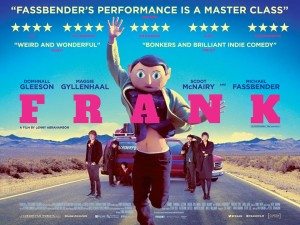
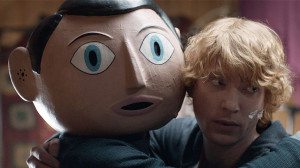
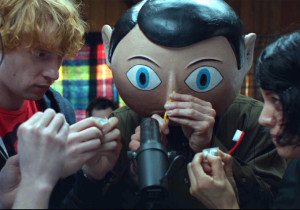

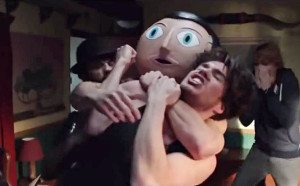
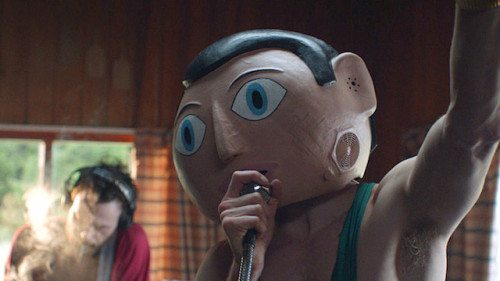
You don’t mention that this is based on a real band, made by a member of the band. I’m not sure if you know that. Not that it affects your review really. Here’s a good article on the backstory: http://www.theguardian.com/culture/2014/jan/12/frank-sidebottom-movie-michael-fassbender-chris-sievey
Yeah. That is curious, mostly because Jon is based on the guy who was in Frank Sidebottom’s band — and he’s a real douche in the movie.
I don’t quite hang with this review. I thought the first third of Frank was absolutely marvelous. I loved it. Loved, loved, loved it. Don, played by Scoot McNairy, was great and really helped translate the weirdness. But then, yes, he offs himself and the film just sinks like a stone. It is unclear what the band wanted from their album or life. Or why Frank would have agreed to go to SxSW. It’s also unclear how Jon could have lived with these people for a year and not understood how fundamentally different he was from them.
It’s a shame, really. It starts so promisingly.
I feel like I became more despondent about the movie the more I wrote about it. I also enjoyed the first third just fine. And then, well, there we are.
I was aware of the actual band in real life connection. But yeah. The movie is the movie.
First point: What did the band want from the album or life? Maybe nothing. Maybe just to have created a perfect musical statement. The movie doesn’t claim there is any purpose to art, but that art is worth pursuing for its own sake. Even if you’re only performing for a bunch of drunks in a dive bar that could give a crap about whether you finish your set or spontaneously combust.
Second point: Frank agreed to go to SXSW because he really wanted to be liked. He wanted mainstream success. That’s why he was hiding his scars beneath the mask.
Third point: Jon did not think he was like them, but he was inspired by them and he ultimately saw in them an opportunity to be popular and successful. He knew he was different from them, but thought (wrongly) that he could actually help them. He says that straight out.
I’m very disappointed by this response to “Frank.” In fact, this is the most disappointed I’ve been by any of your posts. I just watched Frank last night for the first time and I liked it. The more I think about it, the more I like it. There are a few points in your criticism that I want to respond to.
I don’t want to say you’re wrong for not liking it, but I don’t think you’ve given good reasons for your opinion. (Not that I think you need to give reasons for an opinion; but you do give reasons, so maybe they’re worth respond to.)
The main issue you seem to have with it seems to be that the movie does not live up to the “heartwarming indie” sensibility that it promises. However, why should it live up to that? Where was that promise made? I was not expecting a heart-warming tale, so I was not disappointed when I didn’t get one.
I did find the ending rather touching, but it’s a pretty dark tale, a dark comedy more than anything else (though the humor is sparse, the tone is always darkly comedic.) So maybe you were just thrown off a bit because the film didn’t meet your expectations? I’m just guessing, of course, but if that is the case, then maybe there was a problem with the way the movie was marketed? (I didn’t see any previews. I had no expectations. Maybe that’s why I like it so much.)
You also complain that the movie has nothing to say and that it makes obnoxious use of on-screen text. Yet, I think the movie has a lot to say–about art, about success, and about social media. The on-screen display of online text is a crucial part of the story. John’s online presence–his idea of using social media to bring Frank and himself to stardom–is a key element of the plot. So the on-screen text serves a crucial purpose here.
Ultimately, I don’t think we’re supposed to view John as a talentless good-for-nothing. He’s more of a child who might have talent, but has no authentic sense of purpose.
Frank, on the other hand, has an authentic sense of purpose, but it is not pure. He is mentally unstable and part of him still dreams of fame. That’s what almost destroys him. When his fake head comes off, we get the sense that he is now approaching his music (and his bandmates) honestly and openly for the first time. He is now freed from the false idol of mainstream success.
John does recognize all of this. He does realize that he screwed up, that his heart was in the wrong place. But he’s not “found” yet. He’s still lost. So it’s not all tied up in a neat package. But at least Frank is back with his band. Now they can see him cry as he tells them he loves them.
Also, you complain that Gyllenhaal’s character is “angry. All the time. That’s her one emotion for the movie.” I disagree. Yes, she is often angry, but she is other things as well. I think hers is a great role, actually. Sure, it’s a minor role, but she’s playing a powerful, independent, intelligent, passionate, caring, clever, strong, determined and, ultimately, extremely honest woman. And I think she does a great job with it.
Finally, you didn’t even mention the music. One of the best parts of this movie, for me, was that it was about “out there” musicians who actually create music that is interesting and unusual. The music they make in the movie fits and adds a level to the storytelling that you rarely find in this kind of film.
So, all in all, I think there’s a lot to appreciate in Frank. I would highly recommend it.
Well, I hate to disappoint. I think we’ve just got a serious difference of opinion on this one. My expectations were not the problem. I had no need of it being heartwarming. What I was trying to get at was that the movie presents itself as having made certain points and delivered certain messages which its actual content belies.
Now, if you liked it, which you did, of course you’re going to disagree with that assessment. Same with assessments of the characters and what they bring to the story. I became bored with the movie, so found characterizations lacking.
Its message of the purity of art came across to me as muddled. It struck me as a movie that while being about something in a general sense didn’t really know how to go about getting at that something, and so flopped around for its final third.
Okay, I think I udnerstand your criticism better now. I guess it hinges on whether or not Frank and his band are actually better off at the end, or whether they are merely a semblance of something that hadn’t been in need of fixing. I think they’re better off. You could just look at it this way: Frank thought they needed Jon. He thought he needed a fake head. He was wrong on both counts. He was not satisfied with himself or his band. Until the end. So that’s improvement, I think. I also think that Don’s suicide made Frank a bit more desperate, which made him cling more to Jon and the hope of being popular. It all works for me. By the end of it, I don’t like Jon, and I don’t think we’re supposed to. But I don’t want to throttle him, either. I just want him to go away, which he does.
I think you’ve got a good way of looking at it. Probably still won’t make me like the movie experientially, but yes, one could see Frank’s addition of Jon to the band as an example of Frank knowing on some level what he needs, however unpleasant it’s going to be for him. So everything Jon does is in the immediate sense awful for Frank and for the band, but in the end, it’s the journey Frank needed to go on to be able to break free of the head.
As usual, it’s been a pleasure exploring this with you and reaching a deeper mutual understanding about the film. By the way, I wouldn’t say it’s a great film or that I love it. But I think it’s a very good film and I like it quite a lot. I actually want to see it again sooner rather than later. Anyway, thanks for the discussion.
Doesn’t anyone think that Don’s suicide plays a huge role in the whole movie? I mean when he hung himself he had one of Frank’s head’s on and prior to that, he also tells Jon how Frank is perfect and normal compared to him, in which he says he’s ‘miserable and ready to die’. Not to mention the band’s 2 previous keyboardists were both suicidal. After Jon joined the band, he kept getting pushed around by the band members, being seen as mediocre, and was sometimes excluded from the rest of them yet he still supplies rent money for the band. In conclusion, don’t you think that the reason why the 2 former keyboardists were suicidal was because of the abuse they got from the band members, just like how Jon got it from them? (which is why he was the only one of the keyboardists who left)
You may be right. Alas, I saw this too long ago to remember how such details were presented and what they might imply.